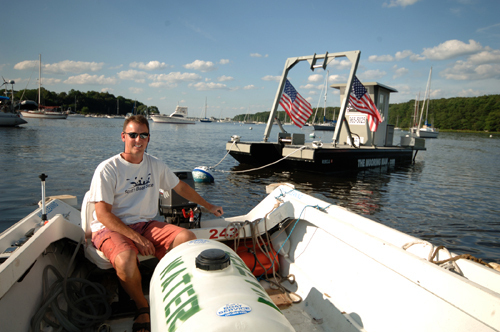
Boaters in Rhode Island are offsetting rising fuel costs by cutting back on splurges, using moorings instead of expensive dock space and enjoying life on the water closer to home.
Boater Scott Leigh, who owns a boat service and repair company called Scott’s Boat Service in West Warwick, said there appear to be fewer boats out on the water this season than in previous years. And those that do take their boats out are using fuel conservatively.
“People are going out on their boats, but are not going out far,” Leigh said. “My boat burns 22 gallons per hour – so at $5 a gallon, that is $110 [per hour]. It’s a lot of money. So if we are going any real distance, we’ll just stay overnight.”
Some of his customers made the decision not to put their boats in the water this season because fuel prices are too high, Leigh said, and others waited a bit longer than usual to put their boats in.
Boaters who couldn’t bear the thought of not being on the water all summer have sought out cheaper ways to keep them in, like using a mooring slightly offshore instead of a dock slip.
The high cost and limited availability of dock space has been a persistent issue in Rhode Island over the years. In response, the demand for moorings – which cost a fraction of what a dock slip costs – has grown, Leigh said. In Warwick, for instance, a mooring license costs only $150 per year, but to dock his 32-foot Carver Yacht in Warwick, it would cost more than $3,000 per year, he said.
Leigh, who also works as a mooring inspector for the town of East Greenwich, said he saw the demand for moorings picking up, so he expanded his boat service and repair business to include setting, moving and inspecting moorings. So far, the mooring part of his business – dubbed The Mooring Man – has been strong; over the past few months he has quoted more than 50 mooring jobs, installed about 10 moorings, and sold about 15 mooring rigs in East Greenwich, Warwick and North Kingstown.
“I’m getting a lot of calls for moorings, because it is a much cheaper option,” said Leigh.
Moorings are so popular that the waiting list for a mooring in East Greenwich is now about four years for residents, and about twice that for out-of-towners, according to the office of the town harbor master.
Newport Harbormaster Tim Mills said that the waiting list for a mooring in Newport is now about 400-people deep – residents have to wait five to eight years, while nonresidents may be waiting for up to 10 years. The long wait is driven by a couple factors.
Dock space is limited and not likely to grow soon. And, said Mills, “recreational boating has grown and the size of boats have, too.”
“Twenty years ago, the average boat was about 20 feet, and now it is 40 feet,” he said. “That puts a pinch on the amount of space available in the moorings fields and on the piers.”
As a result, the cost of pier-side space has gone up significantly in the past five years.
As for boaters already with dock slips, they are offsetting the cost of fuel by staying closer to home.
Derek Leigh, a relative of Scott Leigh who sells boats for Boat World in Warwick, also owns a boat docked at Greenwich Bay Marina in Warwick. He said Rhode Island boaters have the advantage of being able to enjoy the water without traveling very far and wasting fuel.
“I went to Prudence Island on [July 6], spent 10 hours there and only used one hour of run time on the boat. That day it only cost me about $35 dollars in fuel,” Leigh said. “Yes, I run my boat a little slower, and I do not take as many trips, but I am a boater, so I will cut back on going out to dinner three nights a week if I need to.”
He takes his 25-foot Trophy center console to Block Island for vacation every year and, like most boaters vacationing there, anchors the boat for the whole trip.
“A full-week vacation on Block Island only takes about three hours of run time to get there and back, so it is a lot cheaper than taking the family to Disney for a week,” Leigh said.
Robin Emin, who has owned a boat with her husband for three years, said filling their 30-foot boat’s 150-gallon fuel tank at $4.66 per gallon costs $699. Even so, they are using their boat about the same amount of time as previous years, albeit at a slower pace, she said.
“It’s our vacation on the water and it’s a getaway every weekend. It’s still cheaper than the cost of most flights today, and I don’t have to worry about getting stuck on a runway for hours or dealing with lost luggage or airports in general,” Emin said.
Rhode Islander and boater David Rush shares the diehard-boater sentiment and said he refuses to forgo the enjoyment of boating. Instead, he offsets the cost of fuel by cutting out other splurges.
“We value family fun and good times over life’s pains and agonies. Not to belittle the problem of rising gas prices, but it is how we react to life’s challenges that determines the sort of people we are,” Rush said. “For example, maybe my wife and I choose not to have an appetizer and dessert with our dinner, but we will still pull up to the restaurant on the water and enjoy the ride there and back. Rhode Island has the best sunsets from the water, and for us that is worth sacrificing the calamari starter.” •












